TASS
Wellness is not merely the absence of disease and illness. Rather, it is considered a complex combination of a person’s physical, mental, emotional and social wellbeing. Wellness is an active process of becoming more aware of making choices towards a healthy and fulfilling life.
Therefore, one cannot merely run an exercise programme but instead, is called upon to help the community understand and choose a path of wellness.
Moreover, wellness is a multidimensional model.
It consists of physical exercise – i.e. cardiovascular, strength and flexibility, and nutrition, hydration and sleep; as well as mental (resilience, sharpness, self-awareness, self-efficacy, motivation and positivity); spiritual (individual beliefs); social (friendships, community, networking and teamwork); emotional (joy, passion, optimism, hopefulness, empowerment, freedom and happiness); and environmental (safety, friendly and positive) aspects.
The objective of wellness is typically to build a healthy community. This consists of happiness – viz. work-life balance and quality family time, a positive attitude, productivity, fitness, freedom from illness, self-confidence and mindfulness.
A common misconception is that wellness is limited to exercise; however, it is considered much more than this and deemed to cover all six aspects described previously.
Based on Maslow’s hierarchy of needs, a motivational theory, basic needs must be satisfied first, following which the concept of wellness as a whole may be adopted
as part of one’s lifestyle.
It has become vital for companies, institutions and organisations to understand which component of wellness is important at each level, and take the initiative to work through these components based on employee levels and encourage them to embrace this notion of wellness.
Research has revealed the underlying problems, and proven that an unhealthy and unfit community leads to unhappiness, an increase in stress, higher personal healthcare costs, and a lack of quality time spent with family and at work.
As a solution, a comprehensive exercise and nutritional plan, mindfulness teaching and attention to individual needs would likely help build a confident, healthy and happy community.
FAQs
Q: Why do people get headaches starting from the back of the head?
A: This is related to our posture while sitting.
The solution would be ergonomics – viz. changing the height of your seat and table, adjusting yourself to have the correct eye level when viewing screens, taking frequent breaks and improving neck muscle strength.
Q: Should an individual exercise daily?
A: No – it is important to have adequate recovery in-between exercise as recovery is as important as exercise.
Q: How long does it take to notice the results of weight loss?
A: General physical and physiological adaptation takes approximately 12 weeks.
However, there are certain aspects that can be improved much faster depending on the methods used to achieve a goal: the general recommendation is to move to a consistent and sustainable method, which involves diet, exercise, hydration and rest.
We urge everyone to avoid quick fixes in moving towards extreme modalities.
Q: What role does well-ness play in minimising employee turnover?
A: By definition, wellness is about fulfilling a healthy and happy life. Therefore, if aspects are targeted and improved throughout the term of employment, the success rate of retaining an ‘A’ grade employee is higher.
Q: How can gastritis be managed during a 16 hour intermittent fast?
A: Rome was not built in a day. You can progressively improve to a 16 hour fast without affecting your health adversely.
Perhaps begin with a 12 hour fast and gradually work towards a 16 hour fast by increasing by 30 minutes to an hour every week. This will help your body adapt to the changes more easily, thereby reducing the risk of harmful medical conditions.
Furthermore, a word of advice: think about the quality of food consumed when you break your fast. It is highly recommended that a GP is consulted regarding this.










